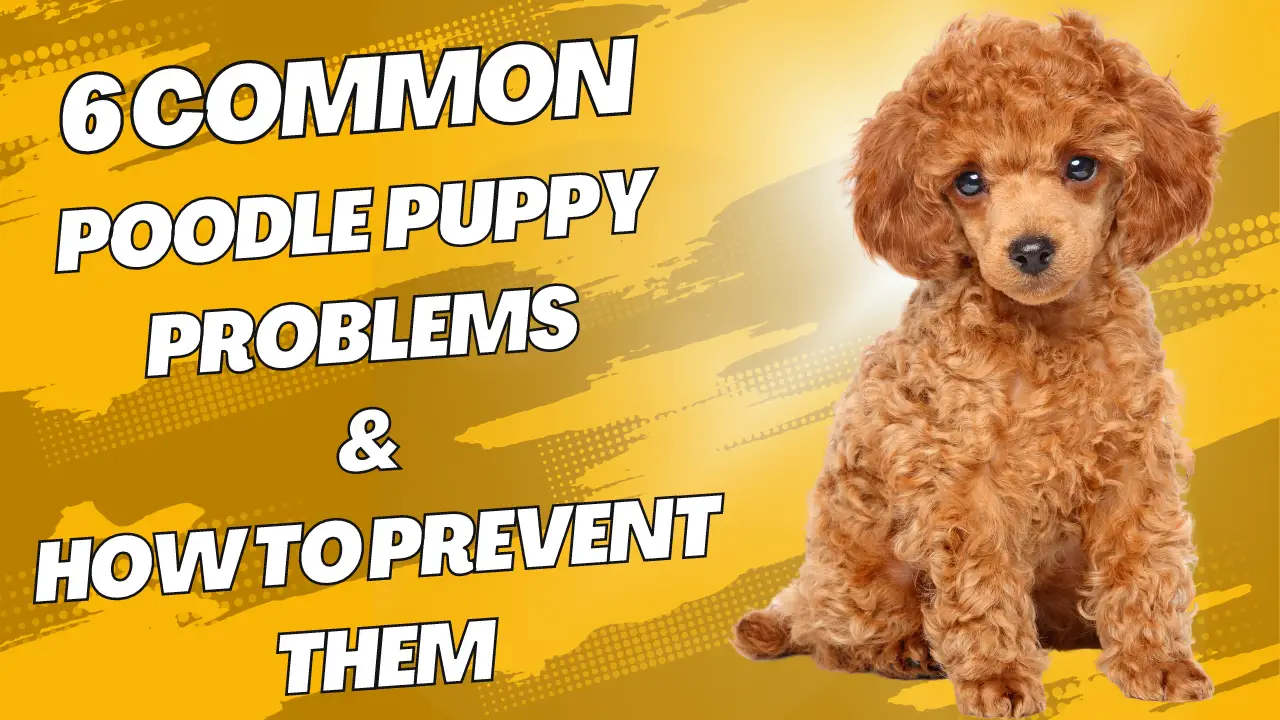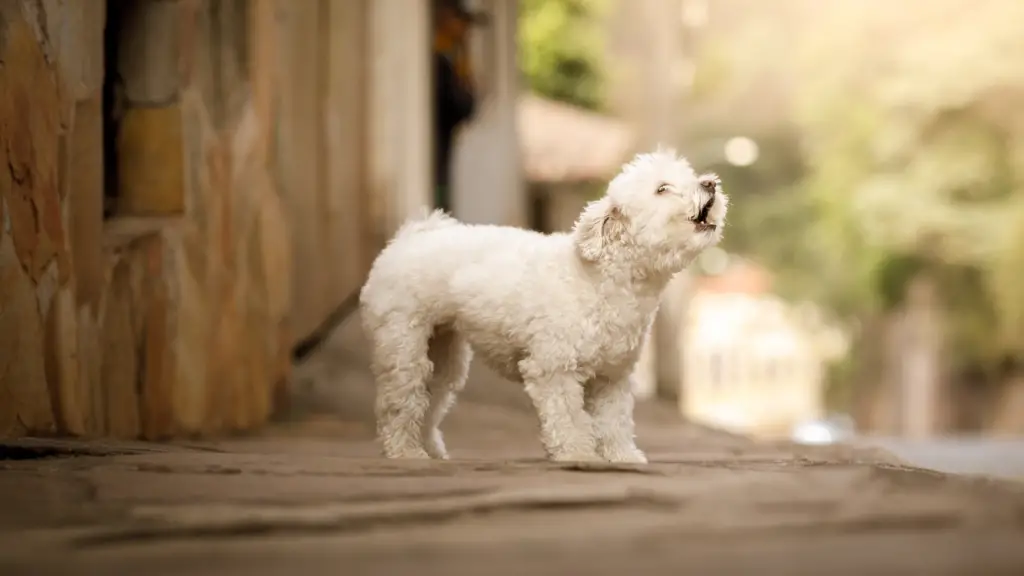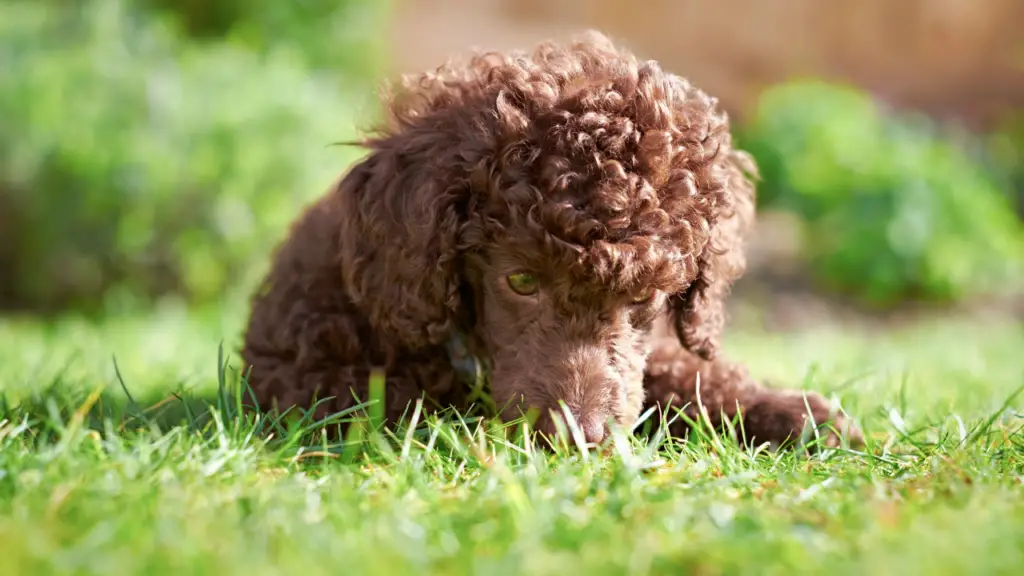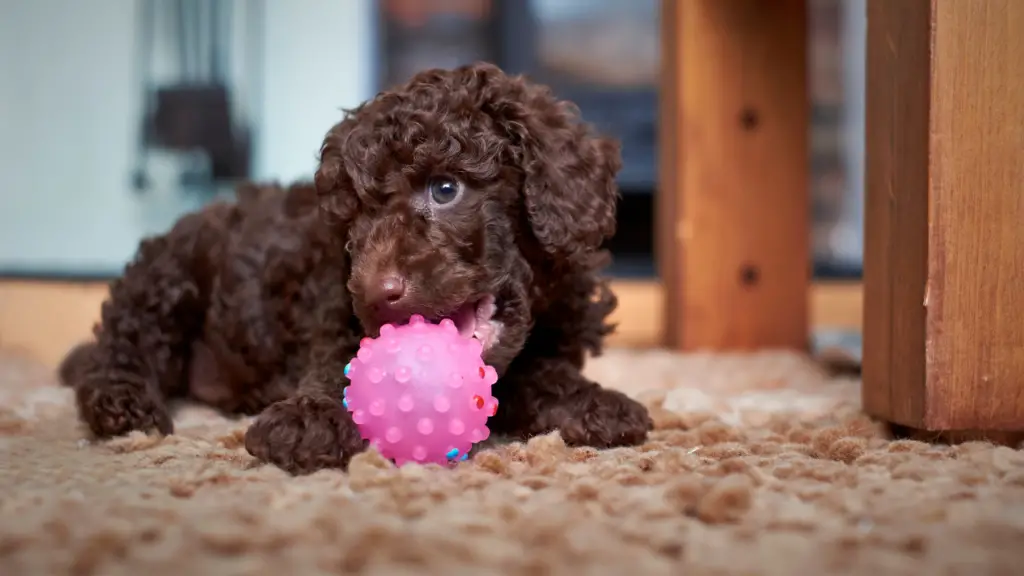Let’s face it, no dog is perfect. We all love our Poodles, but they can sometimes exhibit behaviors that we wish they didn’t. Don’t worry, though – these behaviors can often be improved or corrected with the right training. In this article, I’ll talk about common behavior problems in Poodles and provide tips for addressing them.

If you’re having trouble training your Poodle on your own, we’ll also cover options for seeking professional help. So whether you want to nip those pesky behaviors in the bud or just want to bring out the best in your furry friend, this article is here to help.
What Will You Learn? 👇
Nipping
Like other puppies, Poodle puppy teeth can hurt if they sink into your skin. After all, from 12 weeks onwards, they undergo teething, where their puppy teeth fall out until a new set comes in at 12 months.

Read our Smart Poodles - Smart Tricks eBook for only $2.99
Dive into a treasure trove of engaging tricks and tips designed specifically for your poodle!
You might even be vaguely familiar with this happening to you when you were a kid.
When puppies begin to teethe, they start sinking their teeth into anything possible, whether that be your furniture, shoes, or even your hair, toes, fingers, or arms. This can be known as nipping.
Why do they nip?
Poodle puppies often nip because the behavior stems from playing with their littermates.
Is there a difference between nipping and biting?
When a Poodle puppy sinks their teeth into your skin, you might even think they’re biting, but they’re two totally different actions. Biting is only done as a form of aggression and is often more severe. Nipping is less likely to be aggressive and usually less severe.
While nipping might be pleasant initially, it can hurt quite a lot if it happens regularly. If it happens too much, a biting habit may later form, and trust me; you don’t want to have a Poodle that’s nipping or biting all the time.
Therefore, to prevent this, you will want to start their training from a young age when you bring our Poodle puppy home. Here are some common techniques many pet owners do:
Walk away immediately
If you find your Poodle nipping at you, you should try to discourage it as soon as possible. The best way to do this is just to get up and ignore them when they do it. Poodle puppies frequently nip to get their owners’ attention and to play with them. Suddenly stopping discourages them from nipping and signifies it’s not a good behavior.
Note: For this to be effective, you must consistently walk away from your dog and ensure your family or anyone living in your home does the same. The more this is reinforced, the more likely it will be effective in the long term.
Give them chew toys
Puppies have a natural instinct to chew and gnaw, especially your clothing, hands, or ankles. The best way to satisfy their innate behavior is to give them chew toys to play with.
Note: Always supervise your Poodle puppy with a chew toy in incase they swallow a large edible piece posing a risk to their throat being blocked.
Refrain from punishing
When your Poodle puppy nips or bites, one of the first things you should not do is say no. Instead, try to make a discouraging sound and provide them with a chew toy. Alongside this, you should not hold their mouth closed when they start to nip; this can send them the wrong message when they’re developing. Also, never use their crate to punish them, either!
Yelping like a puppy
When they nip, always stay calm and don’t retaliate. Instead, you should act like a dog and yelp, making a noise of pain before walking away.
Note: If you’re unsure how to stop their nipping, speak to your vet!
Barking
If you plan on getting a Poodle puppy like other dogs, they’ll inevitably bark at some point. Barking for them is a natural method of communication: a request to play, a form of alert, a warning, and a request. Barking can vary, changing pitch, length and rhythm! Moreover, Poodles may bark when angry, fearful, happy, confused, or see a stranger.
While their barking can have several purposes, it can be quite irritating if they do it regularly. Even though you can’t entirely remove barking, it can be reduced and controlled with some basic tips.

But to do this, it’s best if I split the two main types of barking up outdoors and indoors. You must identify the triggers first before learning the techniques.
Outdoor barking
It’s no surprise that your Poodle puppy may love to undergo barking when outdoors. After all, they might bark at animals in your yard or birds due to their predatory instinct. Other reasons they might be barking outdoors are due to the:
- Boredom: They may want attention and play; therefore it might be wise to play a game of fetch.
- Strangers nearby: Your Poodle might be barking if someone new is walking past your house. To limit this, you might want to erect a solid fence making them less likely to bark.
- Wanting to come inside: Another reason could be they might want to come inside. After all, if your Poodle pup has been outdoors for long, they could be cold, hot, wet, or even lonely; just let them in!
Indoor barking
If you live in an apartment or flat indoor barking may wind up your neighbors. It can typically happen if you have noisy vehicles passing by or an emergency vehicle with its siren going. Even your television, radio, blinds, or doorbell may trigger them to bark. To stop them from barking, you’ll want to do the following:
Practice ringing the doorbell and knocking
While the doorbell, knocking, and arrival of people may scare your Poodle, you can eliminate this by creating an association. Try at different times ringing the doorbell and knocking; if they don’t bark, give them a treat. The same applies to a new visitor in your home; get them to give your dog a treat. So over time, your Poodle can be desensitized to these sounds.
Block discouraging sounds
Often dogs can become exposed to many “new” sounds, which may trigger barking. If you block sounds that can seem scary, it will reduce the likelihood of them feeling anxious. Some of the best ways to do this are using white noise machines, which can hide sounds, or if you don’t want to purchase one, turning the radio to static may do the trick.
Use a calm voice
Sometimes when your Poodle puppy barks, it might be your immediate reaction to shout or even bark back. Often barking can be misinterpreted, and it’s actually an expression of joy. Therefore it’s best when your Poodle barks to use a calm voice. If you’re to yell, you’re more likely to make them bark even louder.
Remove the audience
If your Poodle barks back and you run every time to comfort it, you’re more likely going to reward and encourage their behavior. If your Poodle puppy keeps barking, you’ll want to turn your back and leave your room, and you should also instruct other people to do so. You might also want to try the following:
- Practice leaving the house
- Leave
- Count for 10 seconds and then re-enter your home
- Leave again
- Keep gradually increasing the amount of time you’re gone.
- If your dog starts barking, go back in immediately; if not, extend the time.
If you want to know more about this common issue other Poodle owners are facing, make sure you read Do Poodles Bark A Lot? (What Does It Mean).
Digging

One great thing about Poodles is they’re not big diggers like other dog breeds; they often dig when young and later outgrow the habit. For many dogs, digging is a form to distract themselves from anxiety and stop boredom. It’s often a big sign they lack mental and physical stimulation. However, if you find your Poodle puppy digging, it may be due to the following:
- Too hot: If your Poodle puppy is too hot, it might be because they want to lie down in a cool hole.
- Chasing an animal: Poodles used to be retrievers and have the instinct to chase. If there’s a rodent or critter around that disappears under a fence or hole, that might be why.
- Boredom: Another reason they might be digging is plain old boredom.
How to stop digging?
Here are a few strategies to stop your Poodle from digging:
1. Add a fitting area: Mark off your yard with low boards to stop them from digging.
2. Add soil, sand, or gravel: Adding a substance to the area will encourage your puppy to dig but not into the garden.
3. Bury toy or treats: Burying your Poodle puppy’s favorite toy or treats will encourage them to dig in the new spot. If you wish, you can even go a step further and add bacon grease underneath the surface! Similarly, if you notice your Poodle going to other yard areas, you might want to add more toys and treats under the surface!
Crying & Whining
Often your dog will cry or whine when left alone; Poodles do this to call out for attention. This noise is typically made to express anxiety and insecurity.
In addition, they may be whining as a form of communication, and often, there may be more than meets the eye when it comes to their whining. Some common reasons why your Poodle puppy might be crying and whining are:
Asking for something
Your dog might want to have something from you like a certain food, toy or taken on a walk.
They’re in pain or discomfort
Puppies may wine if they’re in pain or sick; if they’re not feeling too well, it may be their way of getting attention. Similarly, whining might be a way for your Poodle puppy to calm itself down and distract itself if they’re in pain. If you’ve tried to stop them whining, you might want to take them to a vet to rule out any potential medical issues.
They may be stressed
Look out for signs of your Poodle licking its lips, yawning, or averting its eyes, signifying stress. When stressed, they may whine, be fearful, and show signs of cowering and a tucked tail.
How to stop whining and crying?
To stop your Poodle puppy from whining or reduce the chances of them whining, you’ll want to do the following:
Think about why they may be whining
Sometimes it’s best to look at the situation objectively and see why they might be whining or crying. When doing this, you should never yell or punish them, as this could make them more fearful and anxious, which could trigger aggressive behavior.
Don’t give in immediately
You should never immediately give in to their wants, as it’s more likely to encourage them to whine. Often this is the most common reason why Poodle puppies whine. So try to resist, and in the process, you’ll avoid them becoming a whiny adult Poodle in the future!
Selectively Respond
You’ll want to respond selectively to your Poodle’s whining; it’s all about strategy. If you think there’s no real need behind their whine or cry, ignore it. If you see them become silent, praise or treat them. However, if you’re confident they want attention or food, you’ll want to redirect their whining to another behavior.
Give them a nice environment
Add plenty of toys and exercise into your Poodles routine. Giving them enough mental and physical stimulation can discourage boredom behaviors, stopping them from whining.
Chewing
Many Poodle puppies love to chew on a variety of objects based on their mood. Sometimes they like to chew because they feel anxious, teething, and more.
Anyways, chewing is a natural behavior, and you should never entirely eliminate your Poodle from chewing. It’s just important you have the right toys in place to stop them from chewing on your expensive rug!

Now the type of toys your Poodle might like to chew on can be entirely subjective. Some dogs love nylon bones, others stuffed toys, and other hard toys where you can add treats or peanut butter. If you find your Poodle chewing on something, swap it for a toy immediately.
If they’re chewing as a result of teething, then you’ll want to give them something cold. To do this, it’s best you wet and freeze particular objects like a washcloth or tennis ball. You can even sometimes give your Poodle an ice cube or two.
Prevention tips
All of the above are common problems you’ll likely face while your Poodle puppy is growing up. They’re nothing serious and can be controlled with the following:
Socialization
During your Poodle puppy’s first three months, you’ll want to take them through a socialization period. Doing this will permanently shape their features and behavior as they grow up. Once vaccinated, you’ll want to gently expose them to different kinds of people, environments, sounds, and smells when they’re young.
Training
Poodles are a highly intelligent breed that’s easy to train, and results can be seen quickly. However, while many Poodles have steady temperaments, some may need a trainer.
Sometimes Poodles may have an underlying personality problem that requires a trainer, or nevertheless, trainers are great for teaching you the basics on how to reduce common problems like barking, chewing, whining, and any annoying habits.
A qualified trainer must be a member of a professional organization, such as the Association of Pet Dog Trainers (APDT).
The best trainer to seek out is an animal behaviorist; they’re kind of similar to a psychologist or psychiatrist. Their main goal is to figure out the underlying reasons behind behavior and modify it accordingly.
To know about animal behaviorists in your area, you might want to reach out to your veterinarian, who can refer you to one.
Here are some useful links worth checking out:
- American Veterinary Society of Animal Behavior (AVSAB)
- Animal Behavior Society (ABS)
- International Association of Animal Behavior Consultants (IAABC)
Note: When looking for a behaviorist, ensure they have the relevant credentials. Many people are posing as behaviorists who are amateurs paying high fees.
Private lessons
If you see a specific problem with their behavior, like biting or aggression, and can’t correct it yourself, you might want to hire a professional trainer for private lessons. Trainers can come to your home or you can go to their own school to focus on the specific problems. In a classroom setting, a trainer won’t have time to focus on the root cause of them.
Note: Often, it’s best to ask for recommendations to find a qualified trainer to come to your place. Always look for a trainer specializing in dealing with a certain problem and check their credentials!
I hope this article has provided you with the knowledge and tools you need to raise a well-behaved Poodle pup. If you have any additional questions or tips for training Poodles, feel free to leave a comment below.
Marko is the founder and author at PoodleHQ, where he blends profound expertise with formal training in Animal Behavior and Canine Genetics. With multiple generations of poodles under his care, he’s a breed connoisseur, honored with the Canine Care Excellence Award and lauded by the International Pet Enthusiasts Association.

